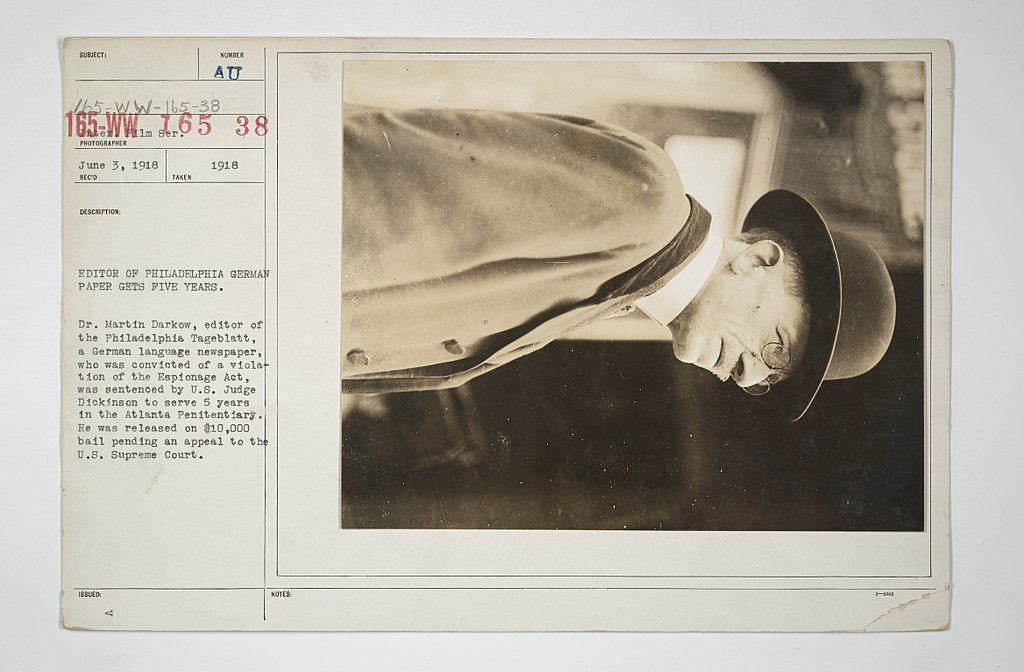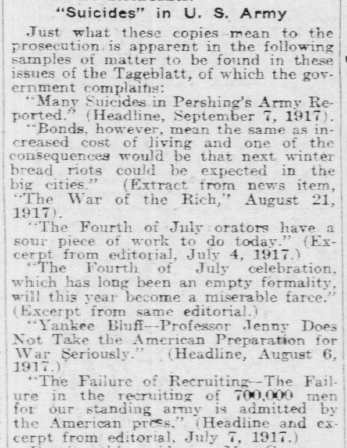September of 1918 was a fraught time in Philadelphia.
Day after day, newspaper headlines carried a grim mixture of battle updates from the Great War, seemingly endless lists war casualties, appeals for Liberty Loan bond donations, and cautious warnings about a new and dangerous strain of influenza that had begun to sweep army camps, killing with great speed and gruesomeness. Locally, however, another drama was playing out: a court trial that would have serious implications for the German-American community of Philadelphia and the limitation of free speech in wartime.
The Philadelphia Tageblatt was one of several German-language newspapers that catered to the large communities of German-speaking immigrants in the city. Founded in 1878, it "was instituted to fill the desire of the German Social Democrats here for a newspaper of their own." [1] The news it provided generally followed along anti-monarchical and pacifist lines- which is why the editorials that appeared in the paper following the U.S. entry into the Great War in April of 1917 were increasingly critical in tone.
Conflicted Immigrants
Many German-Americans found it difficult to support a war that could claim the lives of their friends and family members. But in wartime this attitude was looked upon with suspicion, and immigrants frequently found themselves having to defend their American citizenship by denouncing their German heritage. This distrust of 'the Huns' extended into the highest reaches of government. The Trading with the Enemy Act, the Espionage Act, and the Sedition Act- all targeting criticism of the government, especially by naturalized citizens "pour[ing] the poison of disloyalty into the very arteries of our national life" - passed into law shortly following the U.S. entry into the war. [2]

It was under the enforcement of these Acts that federal agents raided the offices of the Philadelphia Tageblatt in 1917 and arrested a number of employees, five of which would later come to trial for sedition and violation of the Espionage Act. The defendants, all of German descent, were Peter Schaefer (publishing company president); Paul Vogel (treasurer); Louis Werner (chief editor); Dr. Martin Darkow (managing editor); and Herman Lemke (business manager). At trial, which began on September 23rd, the government sought "to show by these exhibits that the defendants with a common knowledge, intent and purpose, willfully substituted words and sentences in copied news dispatches so as to change their meaning and effect, and give encouragement to the friends of Germany and at the same time ignore, belittle, criticise and discredit any news favorable to the United States or any of the other countries making war against Germany." [3]
Among the evidence presented by the prosecution were a number of (translated) excerpts from the Tageblatt in 1917, including the following (From “Alien Foes Aided Tageblatt, Federal Evidence Discloses.” Philadelphia Tribune, Sep. 25, 1918):

“Alien Enemies of this City”
Prosecutors attributed the paper's increased subscribership to a dangerous public, claiming: "the Philadelphia Tageblatt was subscribed to and fostered by alien enemies of this city because of its rabid and defiant pro-German stand in the face of all laws and warnings to the contrary." [3] Throughout the trial, the paper's anti-war stance was continually framed as an anti-American one. "You write," one of the prosecutors questioned frequent editorialist Louis Werner, "that peace will come from the masses and that the sooner we come to our sense the better. Do you think the influence of that statement friendly to the United States?" [1]
The defendants were all convicted on September 27, 1918, setting a precedent that struck a blow to the free speech protection of already-besieged German-Americans across the U.S. [4] This trial and other similar ones caused what a contemporary writer termed the strategic retreat of the German-American press into a tailspin of justifications for their very existence, often resulting in blatantly Americanist declamations. "A potent corrective for the negative attitude of certain papers," the North American Review noted approvingly, was the increasing pressure of an awakened patriotism among all Americans, including the vast majority of citizens of German ancestry. [5]
Each of these pieces of evidence seems extraordinarily tame from a modern perspective. But in the midst of wartime, in 1918, they were considered treasonous. Fueled by suspicion of socialist-leaning, supposedly radicalized immigrants embedded in the landscape of Philadelphia, the jury took just two hours to convict the staff of the Tageblatt, denying them their right to free speech in the process. [4]
Works Cited
- “Tageblatt Editor Upholds U-Boats, Derides America.” Philadelphia Tribune, Sep. 26, 1918.
- Wilson, Woodrow. “Third State of the Union Address, 1915.” Wikisource, https://en.wikisource.org/w/index.php?title=Woodrow_Wilson%27s_Third_State_of_the_Union_Address&oldid=4791543
- “Alien Foes Aided Tageblatt, Federal Evidence Discloses.” Philadelphia Tribune, Sep. 25, 1918.
- “Guilty, Is Verdict for Tageblatt Men in Espionage Case.” Philadelphia Tribune, Sep. 28, 1918.
- Park, Clyde W. “The Strategic Retreat of the German Language Press.” The North American Review 207 (1918): 706-719.
This article originally appeared in a slightly different format on the Steemit platform and carried this tagline: "100% of the SBD rewards from this #explore1918 post will support the Philadelphia History Initiative @phillyhistory. This crypto-experiment conducted by graduate courses at Temple University's Center for Public History and MLA Program is exploring history and empowering education. To learn more click here." It is no longer accruing Steem cryptocurrency.